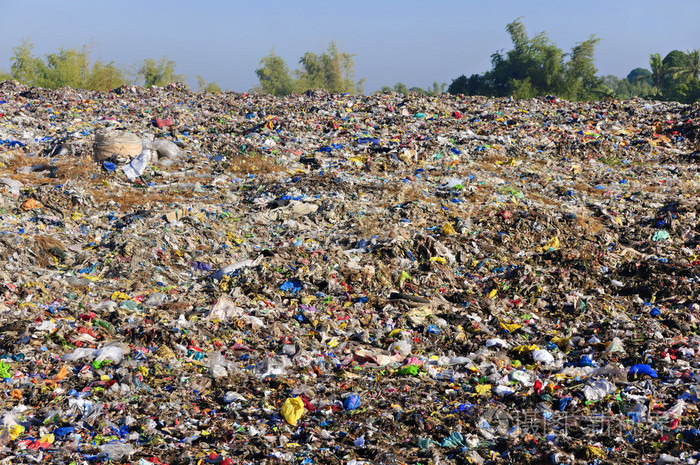Landfills are an unavoidable waste management method in modern society. However, with the acceleration of urbanization and population growth, the environmental impact of landfills has become increasingly significant, particularly concerning methane emissions. Methane is one of the primary greenhouse gases contributing to climate change, with a warming effect 25 times greater than carbon dioxide. Therefore, effective methane control and monitoring have become the core strategies of environmentally sound landfill management. This article summarizes the environmental strategies in landfill management, focusing on the latest developments in methane control and monitoring, and explores how advanced methane detection technologies can enhance the environmental performance of landfills.

1. Sources and Hazards of Methane Emissions from Landfills
Methane emissions from landfills mainly originate from the anaerobic decomposition of organic waste by microorganisms. In landfills, organic matter decomposes in an oxygen-deprived environment, releasing significant amounts of methane gas. Methane not only poses severe environmental threats but also carries the risk of explosions and fires, endangering the safety of nearby residents. Additionally, methane emissions from landfills significantly contribute to climate change, making it a critical area for global greenhouse gas reduction.
2. Environmental Strategies for Methane Control
2.1 Landfill Gas Collection and Utilization
The most commonly used strategy for methane control is capturing landfill gas through gas collection systems and converting it into energy. These systems typically consist of leachate pipes, gas wells, and vacuum pumps that transport methane to generators or boilers for energy production. This approach reduces methane emissions and transforms waste gas into renewable energy, creating economic benefits.
2.2 Optimization of Capping Systems
Capping systems are crucial for controlling methane emissions in landfills. By installing high-density polyethylene (HDPE) membranes or clay layers on landfill surfaces, methane leakage can be significantly reduced. Recently, advanced capping systems such as biocovers have gained popularity. Biocovers utilize soil microorganisms to biologically oxidize methane into carbon dioxide and water, thus reducing greenhouse gas emissions.
2.3 Optimization of Landfill Operations
The operation of a landfill significantly affects methane emissions. Efficient waste layering, compaction, and filling practices can minimize anaerobic decomposition of organic matter. Additionally, timely application of cover soil and the installation of ventilation pipes can effectively control the generation and release of methane.
3. Application of Advanced Methane Detection Technologies
With technological advancements, methane detection technologies have made significant progress, providing new methods for environmental management of landfills. These technologies enable more precise and faster monitoring of methane emissions, offering data support for environmental regulation and control measures.
3.1 Drone Remote Sensing Technology
Drone remote sensing technology allows for rapid and comprehensive monitoring of methane concentrations in landfills. Equipped with methane sensors or infrared spectrometers, drones can conduct aerial scans of landfills, identifying hotspots of methane leaks. Compared to traditional ground detection methods, drone technology offers broader coverage, higher flexibility, and significantly improved detection efficiency.
3.2 Laser Spectroscopy
Laser spectroscopy is an advanced method recently applied to methane detection. By emitting laser beams at specific wavelengths, it can precisely measure methane concentrations in the air with high sensitivity. This technology performs exceptionally well in landfill methane leak monitoring, providing real-time and accurate methane emission data.
3. 3 Internet of Things (IoT) and Big Data Analysis
IoT technology enables real-time monitoring of methane emissions by deploying multiple sensors in key areas of landfills. Data collected by the sensors are transmitted to cloud platforms for processing and analysis using big data techniques. These systems can not only provide early warnings but also evaluate the environmental performance of landfills, helping managers optimize control strategies.
4. Recommendations for Enhancing Environmental Performance in Landfills
To further improve the environmental performance of landfills, the following measures are recommended for methane control and monitoring:
4.1 Increase Investment in Methane Detection Technologies
Enhance the capabilities of landfills for real-time monitoring by investing in advanced methane detection technologies to provide scientific data for environmental decision-making.
4.2 Improve Landfill Gas Collection Systems
Optimize landfill gas collection and utilization systems to ensure high methane capture efficiency while exploring more ways to utilize methane, such as in biofuel cells.
4.3 Promote Eco-Friendly Landfill Technologies
Promote the use of ecological landfill and biological oxidation techniques to reduce methane emissions and control the generation of greenhouse gases from the source.
Conclusion
Methane emissions from landfills pose a significant challenge to global climate change and environmental management. By implementing effective environmental strategies and advanced monitoring technologies, methane emissions from landfills can be effectively controlled, enhancing their environmental performance. In the future, as technology continues to advance and environmental policies improve, landfill management will evolve towards more efficient and environmentally friendly practices, making a positive contribution to reducing global greenhouse gas emissions.






